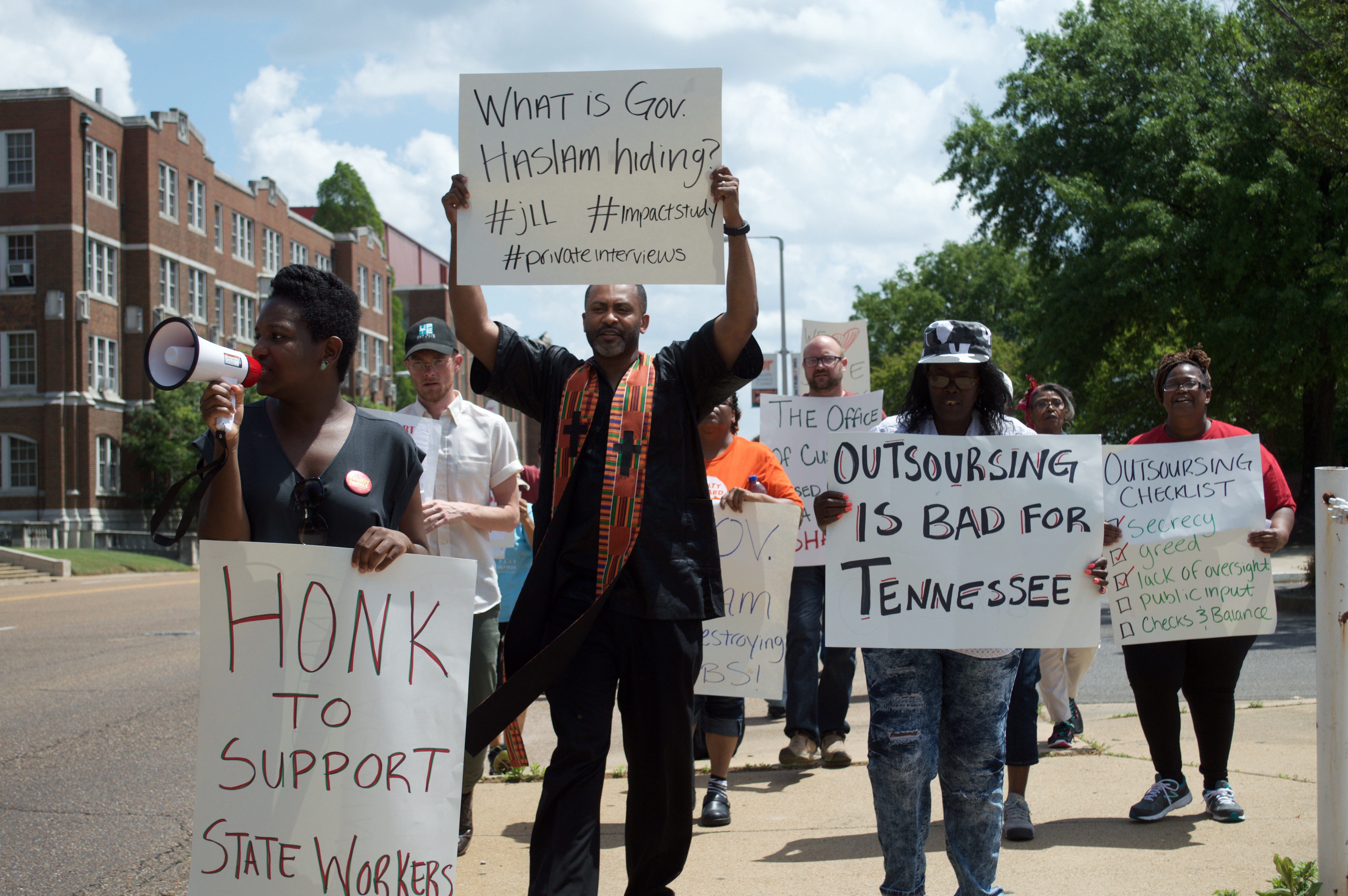 Micaela Watts
Micaela Watts
On April 19, campus workers and union representatives waited outside of the University of Tennessee Health Science Center to confront Terry Cowles, who was meeting with university officials to discuss details of the proposed outsourcing.
State officials have already signed a controversial contract to outsource work in state-owned facilities, a move some watching the issue called a “betrayal of public trust” as the signing came days before it was even supposed to be presented.
According to a public document released by the state’s Central Procurement Office, the state of Tennessee signaled that the contract for outsourcing custodial and maintenance services in state-owned facilities would be presented to commercial real estate giant Jones Lang La Salle (JLL) on April 24.
David Roberson, a Department of General Services spokesperson, confirmed with the Memphis Flyer that the contract was signed on Friday, April 21, three days ahead of the date the contract was to be presented unsigned to JLL. Roberson said the jump ahead of schedule was nothing unusual.
“I’m not sure that’s a tremendous difference, between late Friday afternoon and 9:00 a.m. on a Monday morning, are you telling me that’s a bad thing?” asked Roberson.
The union representing public university workers, United Campus Workers (UCW), contend that yes, it is a bad thing.
“This move is consistent with their pattern of doing things in secret,” said UCW spokesperson Thomas Walker, who added that the hastened timeline doesn’t necessarily put UCW in a different position, but it further signals “a betrayal of public trust, accountability, and democracy”.
Though Governor Bill Haslam has repeatedly said that outsourcing state facilities will save the state upwards of $35 million a year, the outsourcing plans have been met with increasing bipartisan criticism, and multiple protests by students at potentially affected universities.
Just days before the contract was signed, 42 Tennessee legislators signed a letter addressed to Terry Cowles, Director of the Office of Customer Focused Government (OCFG), the office that oversaw the outsourcing plan, urging Cowles to halt the process until economic impact statements have been reviewed by legislators in both rural and urban districts.
For urban areas such as Memphis and Knoxville, the impact of outsourcing will be felt most heavily by campus workers, and state-run detention centers. In rural areas, state park employees will likely be the most affected category of public workers.
The shared concern by both factions is a reduction in wages and benefits, but OCFG spokesperson Michelle Martin is adamant that it won’t be the case.
“Contractors weren’t even allowed to bid unless they could match wages and benefits of the state’s employees,” said Martin.
Martin emphasized that in the case of public universities, the institutions would still have complete discretion on whether or not they would opt to contract with JLL.
“It’s really about whatever makes the most sense for these institutions,” said Martin.
While this has been a stressed point throughout the privatization process, UCW is quick to draw attention to lines in the state’s own request for proposals, which they feel are largely unanswered at this point.
[pdf-1]
In the past, the repeated figure for savings through outsourcing has been $35 million a year. But without economic impact statements requested by both Democratic and Republican lawmakers, that figure is uncertain, though Martin explained that the $35 million is an estimate figure, and is drawn from a scenario in which all state facilities participate fully in outsourcing their non-specialized workers.
Like the $35 million, the state’s own timeline for contracting with JLL is also an estimate, at least according to Roberson.
“These dates aren’t promises, and they weren’t absolute guarantees,” Roberson said. “They’re estimates.”
This story will be updated with additional statements and information.
 The Commercial Appeal
The Commercial Appeal 

 Micaela Watts
Micaela Watts  Micaela Watts
Micaela Watts  Courtesy of Lauren Crews
Courtesy of Lauren Crews 

 Courtesy of the Save the William C. Ellis & Sons Ironworks and Machine Shop Facebook page.
Courtesy of the Save the William C. Ellis & Sons Ironworks and Machine Shop Facebook page. 
 Courtesy of the City of Memphis
Courtesy of the City of Memphis